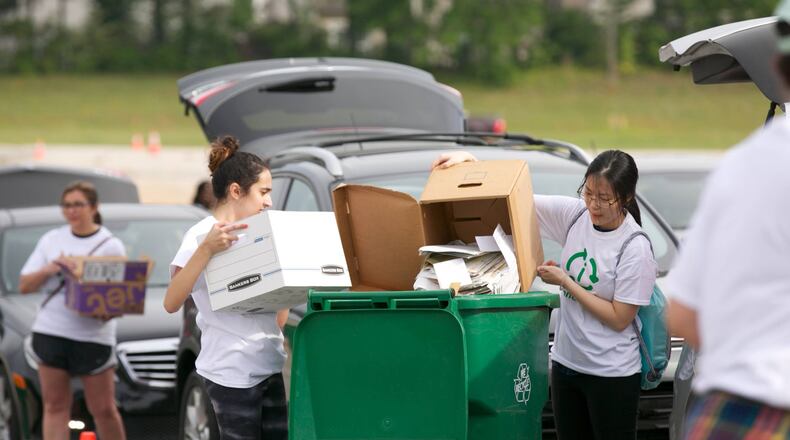A group of Gwinnett County trash haulers have asked the county to renegotiate their contracts in order to both reduce the number of recyclable materials they pick up and charge to collect them.
The county approved agreements in December 2017 that don’t expire until 2026, and were meant, in part, to encourage more recycling. But in a meeting with county commissioners, the haulers said the cost of recycling — which is currently free for residents — has risen. They said they need to add a surcharge in order to sustain it.
And the haulers have asked that any cost increases be retroactive to Jan. 1.
“If you want to continue to do the right thing with recycling, it’s going to cost more money,” said Brad Martin, Republic Service’s municipal services manager for Northeast Georgia.
There are nearly 197,000 solid waste customers in the unincorporated parts of the county who would be affected by any changes. Some haulers said they have made similar requests in the cities, as well.
Commissioners haven’t yet decided whether to take up the haulers’ request, which comes as China, which takes a number of recyclable materials, has drastically reduced its intake.
“The result is unsustainable losses for processors,” said Steve Edwards, Advanced Disposal’s governmental affairs manager for Georgia.
Other local communities have also struggled with recycling over the years. DeKalb County and other jurisdictions eliminated glass recycling as part of what they picked up and processed, and Clarkston this year eliminated curbside recycling entirely. Gwinnett Clean & Beautiful closed its own recycling bank in 2016.
Martin, Edwards and others said they wouldn’t encourage Gwinnett to stop collecting recycling entirely, but they did think changes had to be made.
For starters, they want to reduce the number of recyclable items. Now, residents can put CD cases, aspirin bottles, straws and shampoo bottles into their 65-gallon recycling bins, along with aerosol cans, paperback books and shoe boxes. But the cost to process many of those materials is high, and Martin said the haulers would rather limit recyclables to four key categories: corrugated cardboard, mixed paper, aluminum cans and plastics with the numbers 1 and 2 on the bottom. Those are primarily soda and water bottles and milk, juice, butter and yogurt containers.
With so many recycling options, he said, residents often put items in their bins that aren’t recyclable.
That contaminates the recycling stream. The cost to remove contaminants is high. And while there used to be a market for a wide range of materials, which the haulers would sell, that market has shrunk dramatically. Now, Martin said, haulers have to pay for some of the materials to be taken away.
“The material we’re picking up at the curb has no value,” Martin said. “We can’t operate trucks for recycling for a loss.”
He and others are asking for rate increases that they said would amount to $7 to $9 a year per household for residents to continue recycling. The contract that went into effect in July 2018 meant a $15 annual savings on trash and recycling pickup for residents.
The haulers are asking for a variable price, so they can charge more if their own costs rise and reduce the price for residents if recycling once again becomes profitable. There’s a similar provision in the agreement for fuel costs.
If the county was unwilling to negotiate, the haulers said, they might use a clause in their contract regarding outside forces to compel commissioners to help them.
“You’re looking at litigation,” Gwinnett Commission Chairman Charlotte Nash observed.
Commissioner Tommy Hunter said he thought the haulers were justified in asking for the increase.
“I think it’s a reaction to the facts,” he said. “These companies can’t just do something for free.”
Neill Herring, a lobbyist for the Georgia chapter of the Sierra Club, said he thought the haulers would have to prove they were actually recycling materials — and not throwing them away — if they were going to charge for the service.
“I’m not sure you’re getting anything for the money except a promise,” he said. “It’s very opportunistic on their part.”
Laura Hernandez, a county resident who founded Gwinnett Recycles, said she thinks the county and the companies could do a better job educating people about what they can and cannot recycle. Once that’s done, she said, maybe a rate increase can be considered. But first, more effort needs to be made to reduce the costs by eliminating contaminants.
Residents do want to recycle, she said, and many would be willing to pay for it, if that’s what was needed. But she said there are other steps that can happen first.
“I think it’s on the county, and I think we need to do a better job,” she said.
About the Author
Keep Reading
The Latest
Featured


